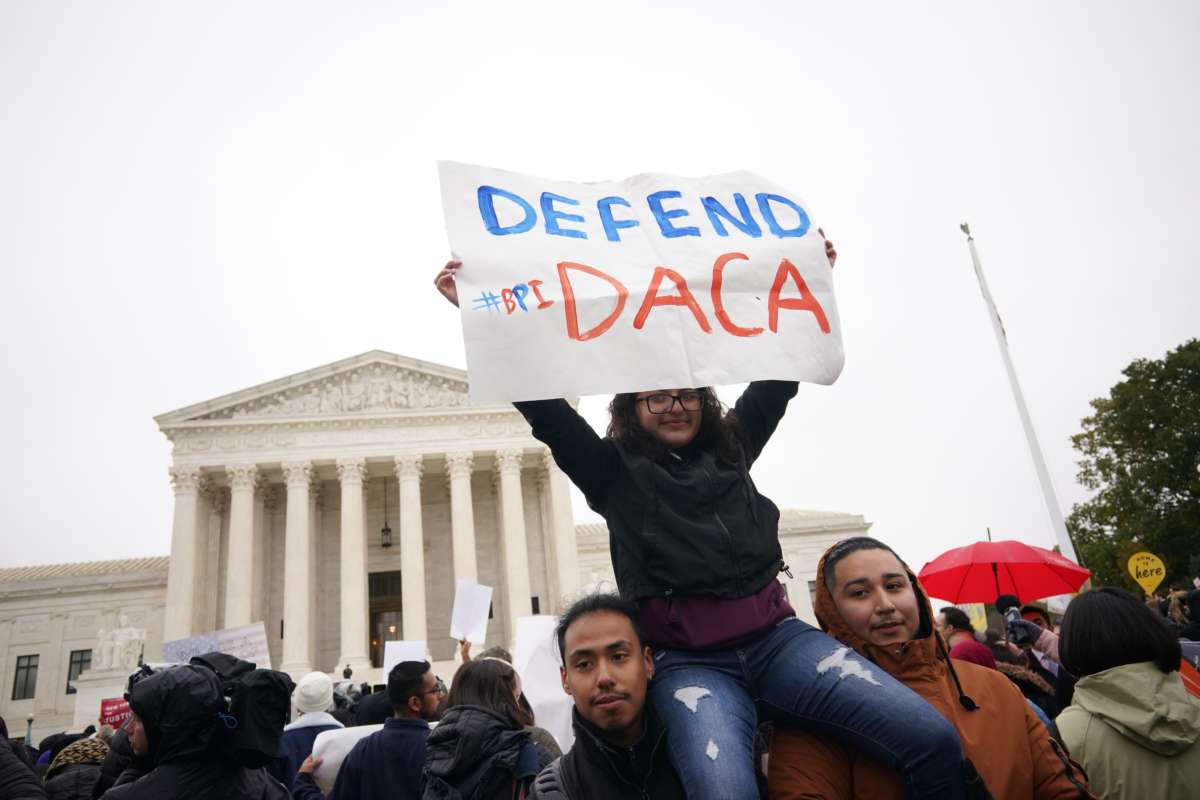Did you know that Truthout is a nonprofit and independently funded by readers like you? If you value what we do, please support our work with a donation.
Delivering a huge blow to President Donald Trump, the Supreme Court ruled on Thursday that the way the administration sought to end a popular program allowing Dreamers (undocumented immigrants who came to the U.S. as children) to remain in the country had not followed the proper steps, thus resulting in the Deferred Action for Childhood Arrivals (DACA) program to remain in place for the time being.
The 5-4 decision of the Court stated that the Trump administration had not adhered to the protocols established by the Administrative Procedure Act (APA). Because those steps hadn’t been followed, DACA was not ended in a proper way, and thus, from a legal standpoint, remained in place, allowing nearly 650,000 Dreamers to stay in the country without threat of deportation for now.
Joining the four liberal justices of the Court, Chief Justice John Roberts authored the majority opinion for the case.
Although the Department of Homeland Security (DHS) under Trump ended the program in September 2017, the agency “failed to consider the conspicuous issues of whether to retain forbearance and what if anything to do about the hardship to DACA recipients,” in violation of the APA, Roberts said. “That dual failure raises doubts about whether the agency appreciated the scope of its discretion or exercised that discretion in a reasonable manner.”
“The appropriate recourse is therefore to remand to DHS so that it may consider the problem anew,” Roberts added.
Pamela Chomba, director of State Immigration Campaigns at FWD.us, celebrated the ruling on social media.
“I still can’t believe today’s #DACA decision. I’m crying tears of joy, I’m relieved, I feel lighter,” Chomba said.
But the ruling, while giving Dreamers a huge victory for now, also grants the administration the ability to end DACA if it goes through the proper steps to do so, a point that Chomba also recognized in her tweet.
“There’s still so much to do. Real justice we need to fight for,” Chomba said.
Dreamers themselves also seemed to recognize the legal victory was bittersweet, and potentially temporary.
“Trump could choose to rescind this program tomorrow,” one DACA recipient said to CNN. “He knows how to do it. The Supreme Court is telling him. So we are not safe.”
Started in 2012 under the administration of President Barack Obama, the program gave qualified individuals who came to the U.S. as children, but who had not obtained documents to become citizens, the right to remain in the country without the threat of being deported, allowing them to work legally and apply for college loans. The program allowed recipients to renew their eligibility every two years.
The program is popular, even among lawmakers on both sides of the aisle. Yet, on two separate occasions, when Democrats and Republicans in Congress announced they had reached a deal to keep the program in place, Trump surprised GOP lawmakers by saying he wouldn’t support those proposals.
Although Trump may now attempt to end the program through the proper steps outlined by Roberts and the majority of the Supreme Court, it may be politically advantageous for him not to do so. With the presidential election coming up in the fall, in addition to the widespread support among the American populace to grant citizenship rights outright to Dreamers, any attempts at dismantling the program at this time could hurt Trump significantly as he tries to win a second term in office.
Press freedom is under attack
As Trump cracks down on political speech, independent media is increasingly necessary.
Truthout produces reporting you won’t see in the mainstream: journalism from the frontlines of global conflict, interviews with grassroots movement leaders, high-quality legal analysis and more.
Our work is possible thanks to reader support. Help Truthout catalyze change and social justice — make a tax-deductible monthly or one-time donation today.
